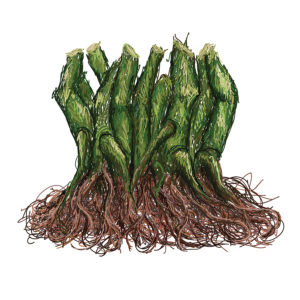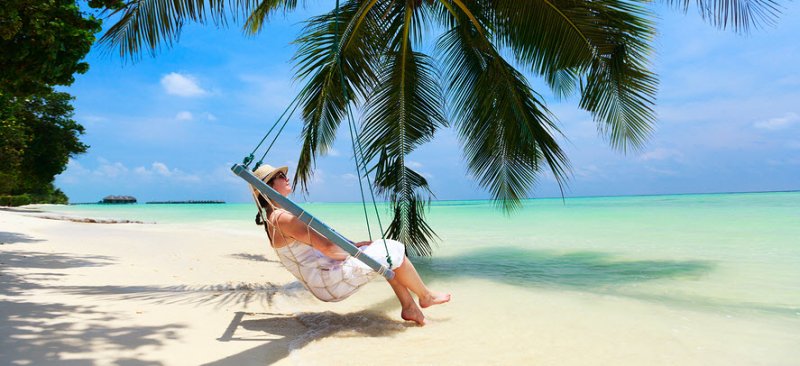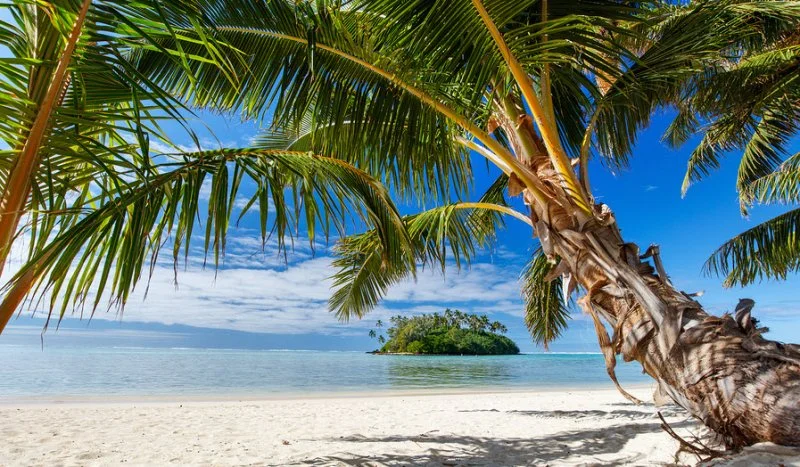Table of Contents
Kava (Piper methysticum) is a small shrub native to the South Pacific islands including Vanuatu, Fiji, Hawaii, and others. And has been safely used by islanders for 3,000 years. Piper methysticum (Piper is Latin for ‘pepper’. And methysticum is derived from the Greek for ‘intoxicating’).
In Polynesia and Micronesia, Kava has been traditionally used as a ceremonial drink. Kava is best known for elevating contentment, mood, well-being and sense of relaxation.
Several clinical studies have found kava to be effective in treating symptoms of anxiety. Other studies have shown kava to help improve sleep quality.
As a nootropic, kava is used primarily to lower anxiety with a potency rivalling some anti-anxiety prescription drugs.
Kava helps:
- Neurotransmitters. Kava affects brain levels of GABA receptors. GABA is the ‘calming’ neurotransmitter. And an increase in receptor sites for GABA accounts for Kava’s anti-anxiety properties.[i]
- Neuroprotection. Kava provides protective effects against strokes. Two of Kava’s compounds, dihydromethysticin and methysticin are similar in potency to Memantine which is used to treat Alzheimer’s Disease.[ii]
- Cognition. Kava improves reaction time and cognitive function. Kavalactones in Kava interact with ion channels in the brain. Influencing neurotransmitter function.[iii]
What is Kava?
Kava (Piper methysticum) is an herb that’s native the South Pacific islands. It’s traditionally been used in the islands as a hypnotic, psychotropic, and anxiolytic (anti-anxiety).

Kava continues to have a central place in everyday life in the islands where its grown. [iv] It’s used as a ceremonial beverage in Fiji where it’s commonly given to the Head of State.[v]
Kava root contains a collection of 6 bioactive compounds called kavalactones (kavapyrones); including kawain, dihydrokavain, methysticin, dihydromethysticin, yangonin, and desmethoxyyangonin. Kava also contains small amounts of other alkaloids, flavonoids and glutathione.
The presence of glutathione seems to reduce the toxicity of some other kavalactones. Standardized extracts are important in deciding on what Kava supplement to buy to ensure reliability and safety.[vi]
The main compounds in Kava readily cross the blood-brain barrier. And reaches your brain in about 45 minutes after taking the supplement.[vii]
How does Kava work in the Brain?
Kava boosts brain health and function in several ways. But two in particular stand out.
- Kava boosts cognition. Kava relaxes the muscles and mind, but it doesn’t affect cognition the way other antidepressants and anti-anxiety drugs do.
After a review of 10 clinical studies of Kava, scientists at Australia’s Brain Sciences Institute at Melbourne University found Kava did not negatively affect cognition. In fact, some studies on Kava showed it “significantly improved visual attention and working memory processes”.
The research team stated that Kava’s “enhanced cognition may be attributed to the ability of Kava to inhibit re-uptake of noradrenaline in the pre-frontal cortex”.[viii]
- Kava relieves anxiety. Several clinical studies have shown that Kava relieves anxiety.
California’s Global Neuroscience Initiative Foundation took a look at 24 studies of Kava and other herbal medicines for anxiety. And there was substantial evidence that kava relieved not only anxiety, but also restlessness and insomnia.
They even looked at animal studies that showed Kava has anxiolytic effects “but not sedative or mental impairing” effects “which are typical side effects caused by benzodiazepines”.[ix]
How things go bad
Chronic stress, anxiety, loss of neuroreceptors and neurotransmitters can damage your brain. And one of the ways this manifests is memory loss.
It comes as no surprise that people with memory loss experience higher rates of anxiety and depression. As verified in one Australian research study.[x]
↓ Chronic stress reduces memory capacity
↓ Bioavailability of neurotransmitters decline
↓ Number of neuroreceptors decline
↑ Increase in anxiety destroys quality of life
Under conditions of chronic stress your brain loses the capacity to transmit signals between neurons efficiently. Memory, cognition, and decision-making all suffer as a result.
Kava benefits
 Kava has a long and proven record of medicinal therapeutic value. Much of the clinical evidence supports the use of Kava in treatment of anxiety.
Kava has a long and proven record of medicinal therapeutic value. Much of the clinical evidence supports the use of Kava in treatment of anxiety.
Unlike benzodiazepines, Kava does not have similar sedative and mental impairing effects. And Kava seems to provide this calming effect by increasing the number of GABA-a receptors.[xi]
Kava extracts have also been seen to bind to GABA, dopamine, serotonin and opiate receptors as well.[xii] This implies that more of each neurotransmitter is available to the brain since their associated receptors are blocked or inhibited by Kava.
Kava extracts have also shown antidepressant effects. Some of the trials demonstrating this effect on depression also noted that Kava raised no safety concerns at the doses and duration studied. Unlike some well-known pharmaceutical antidepressants.
Kava has also been shown to boost cognition and attention. In one study researchers stated that Kava’s “enhanced cognition may be attributed to the ability of kava to inhibit re-uptake of noradrenaline in the pre-frontal cortex…”
And finally, Kava also prevents and may even treat several types of cancer. Research shows for example that one of the components of Kava, Flavokawain B reduces prostate tumor growth and inhibits cancer.[xiii]
And that’s just one of many examples of how different components of Kava can fight cancer in the lung, bladder and other organs.
How does Kava feel?
This can be a little complicated so stay with me. Any particular preparation of Kava will contain up to 18 different kavalactones. Each will have some type of psychoactive effect in your brain.
And to complicate things even more, there are several distinct strains of Kava grown in Hawaii and the South Pacific today. All with their own unique profiles of kavalactones and as a result, their own subtle differences in effect.
In general, supplementing with Kava (Piper methysticum) can make you feel relaxed, enhancing calmness and lowering anxiety while promoting sociability.
Higher doses can generate feelings of gentle euphoria, with greater sedation and mild motor impairment.
Many neurohackers say that at lower doses, Kava’s effects are a little like those generated by alcohol and certain kinds of anti-anxiety medications. Some users say it works as well as popping a Xanax.
You should experience an increase in focus along with a sense of calm. And even though Kava works well as a sleep aid, taking it during the day shouldn’t make you drowsy.
Kava Clinical Research
Kava has a lot of clinical research to back up its reputation as a nootropic. Research studies have been noted throughout this article. Here are two more…
Kava as an anti-anxiety therapy
A study at the University of Melbourne, revealed that Kava could be an alternative treatment for those suffering from Generalized Anxiety Disorder (GAD).
In this 6-week placebo-controlled, double-blind trial, 75 patients with clinically diagnosed GAD were given Kava or a placebo.
Participants were given Kava extract tablets twice per day for a total dose of 120 mg kavalactones for the first 3 weeks. In cases of non-response, the dose was increased to a double-dose twice per day for the 2nd three weeks of the trial.
γ-Aminobutyric acid (GABA) and noradrenaline transporter polymorphisms were analyzed as potential pharmacogenetic markers of response. Reduction in anxiety was measured using the Hamilton Anxiety Rating Scale (HAMA) as the primary outcome.
Kava was well-tolerated. And results showed no significant differences in liver function. One interesting observation during this study was that subjects who had genetic differences in GABA transporters modified their response to Kava.
At the conclusion of this trial, 26% of the Kava group were considered in remission for their anxiety symptoms compared to the placebo group. Overall, all participants who received Kava, showed a significant reduction in anxiety levels.
And one additional finding of this study was that Kava increased the female participants sex drive.[xiv]
Kava enhances cognitive performance
Researchers conducted a double-blind, placebo-controlled trial with healthy volunteers. The purpose of the trial was to investigate the effects of Kava on emotions and cognitive performance.
One group was given a single dose of Kava extract (300 mg). And that single dose led to an increase in “cheerfulness”, improved accuracy and speed in task performance, increased visual attention and a boost in short-term memory.
The research team compared the effects of Kava to conventional benzodiazepine-type anxiolytics which tend to impair cognitive performance. The team concluded Kava is a potent anxiolytic agent which can boost cognitive function.[xv]
Kava Recommended Dosage
Kava extracts are made with a variety of different strengths, and from different source plant material. So it’s difficult to recommend exact dosages.
Fortunately, Kava is relatively forgiving as far as dose is concerned. So taking 2-3 times the recommended dose of an extract should cause no issues.
Some neurohackers claim that extracts are just not strong enough. And the only way to get the full effect of Kava is to use ground Kava root which can be found at some natural food stores. Make sure it smells fresh (it should have a relatively strong smell).
Fresh powder is used to make a cold tea by making a cold water extraction. Fresh powder is soaked in cold water for 15-20 minutes or more, stirring or shaking occasionally. You can then strain out the powder if you like.
If you want to go the capsule route, look for a Kava extract called “WS1490”. For anxiety and other cognitive issues use 300 mg of this extract daily. Preferably split into three 100 mg doses. One dose in the morning, one early afternoon and the last in the evening.
You can also choose a Kava extract supplement with 250 mg total kavalactones. You can use this multiple times throughout the day. If you use only a single dose, take it just prior to sleep.
Kava Side Effects
Kava has a long and proven track record of medicinal therapeutic value. But if you start doing research on Kava, you’ll see reports of possible liver toxicity. Let’s address this right now.
Most research shows there is little to no evidence to support this notion of liver damage when using Kava. For example, one large review out of the University of Melbourne included 24 clinical studies.
One of the researchers stated, “Of the 435 clinical trial participants taking Kava supplements in our review, some at high doses, no liver issues were reported. Therefore, the current review supports the conclusion that liver toxicity is indeed a rare side effect.”[xvi]
For most of the history of the Kava industry, it’s been harvested and prepared by native, Pacific Islanders. Roots are stored in bulk after harvest. And could develop mold or acquire other contaminants.
Increasingly, many Kava suppliers harvest and process their Kava using international manufacturing standards such as ISO, GMP and others. And because of the restrictions by first world countries (esp. the European Union) on the importation of raw ingredients, these protocols are now stricter.
So when selecting a Kava product, make sure the manufacturer is adhering to good manufacturing practices.
Long-term heavy and consistent consumption of Kava could cause a scaly skin rash called dermopathy. This is reversible when Kava use stops.
And finally, Kava should not be mixed with prescription drugs. Don’t use Kava if you’re pregnant or breastfeeding. Kava use may make you unable to drive (similar to alcohol). Don’t use Kava if you have liver problems. And avoid combining Kava with Xanax, clonazepam, lorazepam, phenobarbital, and Ambien.
Type of Kava to buy
In the South Pacific, whole Kava root are chewed for their medicinal value.
Kava is also available in liquid form, as tinctures, and standardized extracts as capsules or tablets.
Nootropics Expert Recommendation
Kava extract 250 – 500 mg per day
 I recommend using Kava as a nootropic supplement.
I recommend using Kava as a nootropic supplement.
Your body does not make Kava on its own. So you must take it as a supplement.
Kava is especially helpful for those suffering from anxiety and stress. Studies show it helps stop and reverse the devastating effects of anxiety and stress in your brain, and body.
Kava also has a reputation for lifting mood. And doesn’t have the same side effects as prescription antidepressants.
And unlike pharmaceuticals like benzodiazepines, Kava boosts cognition and short-term memory.
The usual serving of prepared Kava in the South Pacific is 2-4 fluid ounces. Depending on how its prepared, a bilo (coconut half shell) can contain anywhere from 150 – 500 mg of kavalactones. And native islanders often consume several bilos in a Kava drinking session.
Although the local Kava Committee has issued an advisory upper limit of 300 mg of kavalactones per day, many Pacific islanders consume far more, without any ill effects.








Join The Discussion - 73 comments
Andrew Richardson
April 3, 2025
So i took Kava really help me relax and get sleep unlikely most stuff i have taken, sadly i saw the liver issue thing not sure what the real studies on this are but could i take this each night for sleep at 250MG long term or recommended to have a break once and awhile
David Tomen
April 4, 2025
Andrew, as long as you keep an eye on your liver numbers.
Pete Owens
September 17, 2024
Have you had any success with restless leg syndrome?
David Tomen
September 18, 2024
Pete, some report that Valerian helps with restless leg syndrome.
Szilvia
April 25, 2024
Dear David!
Can St. John’s wort be taken with kava?
I read that taking the two together increases the risk of liver damage.
Thanks.
David Tomen
April 25, 2024
Any nootropic you use is either processed using your liver or kidneys. The safest thing to do is get your labs done every 4 – 6 months and keep an eye on your kidney and liver health.
Rese
March 31, 2023
I never found a study that says it can increase the density of GABA receptors.
David Tomen
April 1, 2023
https://pubmed.ncbi.nlm.nih.gov/7701051/
Tony
February 16, 2022
Excellent article! I have a bottle that reads Kava Kava Extract piper methysticum. Is this different than the ws1490 and / or Kavalactones?
Also the caps are 700mg. What are your thoughts on that. After reading the article that seems too much all at once. Your input would be appreciated.
David Tomen
February 18, 2022
Tony, WS1490 is a patented extract of Kava which is preferable because you know what you are getting. But otherwise, for Kava to be effective you need a Kava supplement that supplies minimum 250 mg kavalactones which is the main active ingredient in Kava. If it does not say on the bottle or tub you have then ask the manufacturer about kavalactone content.
Ted
February 12, 2022
Thanks for this article. I cannot find the WS1490 where I am from – so have purchased noble kava – on reviews. Piper methysticum ext..dry conc 695mg..any idea on dosage of this or comment on the ingredient?
Also – what is the half life of kava? Should I take just before sleep or with dinner (4hrs earlier as stated on bottle), does it help keep one asleep or just put on the sleep (like melatonin)?
Any contradictions with ltheanine, melatonin to stack? Or should I use switch between these. Thanks for all your hard work
David Tomen
February 14, 2022
Ted, it is difficult to pin down the half-life of Kava because opinions and research varies between 2 – 14 hours. Scroll up to the section called “Kava Recommended Dosage” for more of an explanation.
It’s not contraindicated with natural nootropic supplements. Just avoid combining Kava with Xanax, clonazepam, lorazepam, phenobarbital, and Ambien.
Ted
February 17, 2022
Hi David
Can you recommend any brands? The one I’ve purchased only has 50mg kavalactone s in each capsule. Says one to two tablets. Each tab 695mg extract). Seems taking 5 may be a bit much? Thoughts
David Tomen
February 18, 2022
Ted, Kava is relatively forgiving so you can use higher doses without any trouble. But your mileage may vary. If you are getting the benefit you expect from the one you are using then use the higher dose. Or try this one: https://amzn.to/3gV2qOi